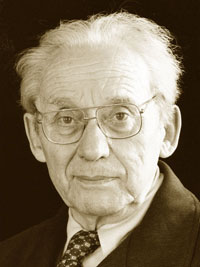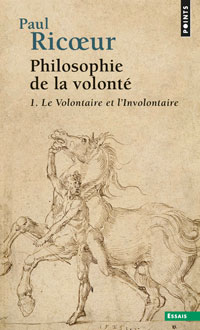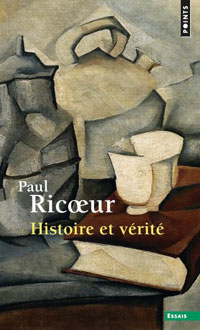



Paul Ricœur
Valence 1913 - Châtenay-Malabry 2005
Paul Ricœur discovered philosophy through his philosophy teacher, Roland Dalbiez, at the Lycée de Rennes. He received his licence en philosophie when he was 20, and passed the agrégation (coming second) in 1935. Long a pacifist, he nevertheless came to recognize the importance of state institutions. In Paris in the thirties, while studying at the Sorbonne, he met Gabriel Marcel who would come to have a great influence on him and contributed to his philosophical formation. At that time he also discovered Husserl’s writings, continuing his studies through a translation of Ideen I while he was a prisoner of war in Pomerania, from 1940 to 1945. In that same P.O.W. camp, in 1942, he realized how strongly attached he was to the democratic socialist values he had defended during the Spanish Civil War. Returning home after the war he taught philosophy for three years at the College Cevenol at Le Chambon-sur-Lignon, during which time he finished his doctoral thesis on the will. In 1948, he was called to teach at the University of Strasbourg, before becoming a professor at the Sorbonne in 1956. Over the next ten years he would write regularly for two reviews : Esprit and Le Christianisme Social, and teach at the Protestant School of Theology, bd Arago in Paris. In 1964 he founded the philosophy department at Nanterre University and was elected Dean of the faculty of arts during the agitated years around the événements of 68. He left this position in 1970, to teach first in Louvain, and then at Chicago University – where he stayed until 1991 – all the while continuing his famous seminar at the Husserl Archives in Paris. It was only in 1980 that he resigned from Nanterre University. The eighties saw the “rediscovery” of Paul Ricœur in France : he burst back into the intellectual scene, with a series of major books and essay collections in which philosophy entered into dialogue with history, law, exegesis, etc. From then on he never stopped lecturing around the world, promoting everywhere a philosophy that addressed contemporary issues. Right up until his death in 2005, Ricœur further developed his œuvre, which has become famous worldwide for its originality, its moral and political commitment, and its exceptional breadth. Ricœur's first published works can be gathered together under two headings, the Philosophy of the Will (1950), and social ethics (History and Truth, 1964). His trajectory then took him from the phenomenology of the act to hermeneutics (De l'interprétation. Essai sur Freud, 1966, and Le conflit des interprétations, 1969), and from there to a poetics of time and action (La métaphore vive, 1975, Temps et Récit, 1983-1985, Du texte à l'action, 1986). In Soi-même comme un autre (1990) Ricœur puts forward a philosophy of the speaking and acting subject, strongly articulated on moral and political philosophy, a theme developed in several essay collections on the problem of justice, both as a virtue and institution (Lectures 1 and Le Juste 1 and 2 beetween 1991 and 2001). He never ceased, however, to engage with the non-philosophical sources of philosophy, especially the Biblical texts (Penser la Bible, 1998). In 2000, he published La Mémoire, l’Histoire, l’Oubli on the question of a just representation of the past, and again in 2004 Parcours de la reconnaissance which situates this right at the heart of the social bond. Ricœur placed himself at the crossroads of three great philosophical traditions : French reflective philosophy ; so-called continental philosophy ; and anglo-saxon analytic philosophy.
Bibliography: Paul Ricoeur : bibliographie primaire et secondaire : 1935-2000, compiled by F. D. Vansina, Leuven, University press, Peeters 2000.